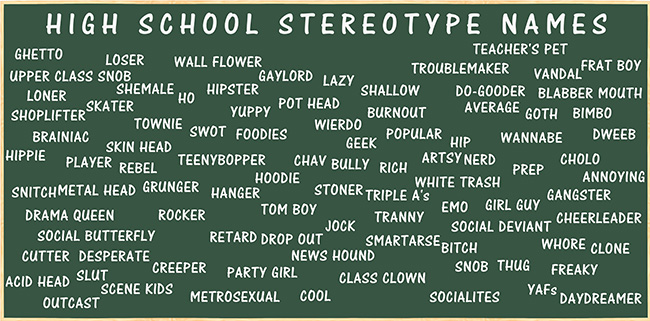ARTICLES, HEALTHY RELATIONSHIPS ADVICE. BEST DATING TIPS
Surviving Cliques


Cliques – those exclusive groups of people you find wandering the halls and cafeteria don’t just exist in movies like Mean Girls. I remember being in high school and seeing them – the jocks and the cheerleaders who always somehow managed to date one another, the kids who listen to heavy metal and have long tangled hair, the eager students who are involved in every school event and fundraiser, the druggies, the theater geeks and so on. I remember that I didn’t fit into a particular group; I was more of a “floater”, making friends with people from random groups.
Being a part of a group definitely has its perks. You have someone to eat lunch with, hang out with on the weekends, and you have someone you can talk to about almost anything. A group of friends can help with transitions into new experiences like high school or parties. A good group of friends acts as a support network with whom you can share your experiences and similar interests, such as a sport, club, TV show or type of music. A healthy group of friends is flexible, allowing new people to enter into friendships with group members. However, when the group restricts who comes into the group, and has certain standards about what it means to be in the group, that group becomes a clique.
The Breakdown of a Clique

A supportive and open group of friends usually means the members have similar interests but still have their own lives and hobbies. In a clique, the members do not necessarily have similar interests. Instead, cliques focus on the power and the popularity of their members. They are exclusive and have strict rules that members need to follow if they want to stay in the group, for example, in Mean Girls, “The Plastics” insist that on Wednesdays, the girls must wear pink, and they can only wear their hair up once a week. The clique does absolutely everything together during school and outside of school. The power is typically centred in the hands of one person and forming friendships with others outside the group is looked down upon, meaning it is difficult to get into the clique once it has already been formed.
Since the power and popularity of the clique is so important usually cliques have problems with gossip or members might turn on one another to challenge or steal leadership. That means the relationships within the clique are not genuine; they are there to help hold up popularity. One of the biggest issues with cliques is that no one inside the clique can really be their own person. There is no real individuality within a clique because the idea is to conform to one identity and to what the leader of the clique says. Usually, those within the clique lack the confidence to simply be their own individual.
Is It Worth Being In A Clique?
Why do people join cliques? Well, sometimes when you enter a new place, all you want is to belong. Most people would think it’s better to be a part of a group rather than be alone, to be on the inside rather than the outside. Also, for some, being popular or having power is most important, and cliques are a way to achieve that. Especially for those who are natural leaders and those who prefer to follow someone else, a clique can seem like a pretty cozy option.

But at the end of the day, cliques will just limit your ability to make real friends, do things that make you happy, and speak your own mind by imposing a strict code on you. Junior high or high school can be a difficult time, especially when it comes to knowing yourself – it is usually when most of us try and figure out what kind of we person we are. When it comes to cliques, it is important that you try and stick to your own beliefs and values about what kinds of friends you want, how you want to be treated, and how you want to treat others.
Stay true to yourself by keeping up involvement in your favorite hobbies, standing your ground and speaking your mind whether it’s in defense of yourself or someone else, and being open and accepting to the idea of having friends from all kinds of circles.
That is what you will make you more popular than limiting yourself in a group based on conformity, rules, power, and gossip.
Written by Adela Czyzewska







